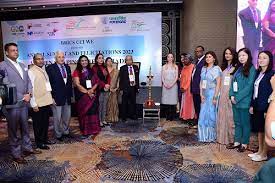The BRICS Women Business Alliance Talks About The Prospects And Challenges Of The Digital Transition For Gender Equity
‘Digital Transition for Gender Equity: Unveiling Opportunities and Overcoming Challenges’ was the theme of a historic session hosted by the BRICS Women Business Alliance (WBA) in Durban. Influential individuals from the BRICS countries gathered at this event to discuss the tremendous influence of digital change in closing gender disparities.
The event, which was moderated by Dr. Thandeka Ellenson, offered a forum for thoughtful discussion among speakers from each of the BRICS nations. Dr. Aarti Gupta of India, Kristina Romanovskaya of Russia, Ji Xiaochen of China, and Veronica Motloutsi of South Africa were on the panel.
The crucial role that the digital transformation has played in promoting gender parity, as well as the pressing need to overcome the difficulties that come with it, were at the center of the panel’s discussion. The dialogue was started by Kristina by emphasizing the need to digitize every aspect of the economy.
Dr. Gupta emphasized the technology’s evident influence on contemporary businesses. She emphasized that about 90% of modern organizations depend on technology in a variety of ways, highlighting the need of embracing digital transformation. With social media, e-commerce, and artificial intelligence (AI) transforming communication, trade, and operations, it is essential for everyone to be digitally proficient, with an emphasis on empowering women.
All of the speakers passionately supported the participation of women in digital business. Digital projects have enormous potential to advance women’s inclusion in the global digital economy. Digital technologies may be used to work remotely, extend their reach, and access new markets by women-led businesses, which are usually smaller in size and focused on retail and the informal sector. This results in significant efficiency advantages.
Dr. Gupta outlined the major challenges that women face in the digital space, which are embodied in the ABCDEF framework:
– Financial Inaccessibility – Access to Devices – Basic Digital Literacy – Cultural Norms in Patriarchal Societies – Educational Inequality – Entrepreneurial Inequality
As the discussion shifted to the need for collaborative action by the BRICS countries, all of the panelists noted common challenges such as knowledge inequalities, patriarchal norms, restricted financial access, and educational discrepancies. Dr. Gupta put forward a thorough plan:
– Make mobile phones and internet-capable gadgets available to women.
– Create a curriculum that is inclusive and focuses on digital education.
– Create a system for gathering and analyzing gender-specific data.
– Promote financing for creative ideas and women-owned digital enterprises.
The BRICS WBA’s discussion on gender equality in the age of digital transformation essentially echoed as a powerful call to action. It emphasized the transformational power of technology and the crucial role that cooperation plays in overcoming the challenges that women face in a time that is characterized by digitalization.







